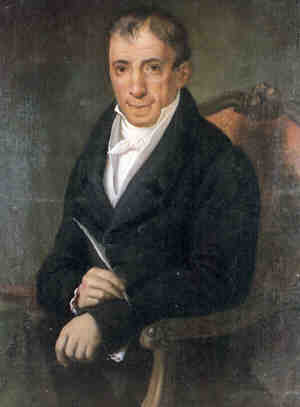Also known as:
Adamadios Korais, Adamandios Korais, Αδαμάντιος Κοραής
More People of Greece
More Topic Categories
Related Destinations
Adamantios Korais (27/04/1748 - 06/04/1833)
 Adamantios Korais or Coraïs was a humanist scholar who played a major role in the Greek Enlightenment, as well as for helping in the establishment of a purified form of the Greek language, known as Katharevousa.
Adamantios Korais or Coraïs was a humanist scholar who played a major role in the Greek Enlightenment, as well as for helping in the establishment of a purified form of the Greek language, known as Katharevousa.His father, Ioannis, was from Chios and gained considerable wealth as a textile merchant in Smyrni, where Adamantios was born in 1748. With financial support from his family, Adamantios studied at the Evangelical School of Smyrni. Meant to follow his father's footsteps, he was later sent to Amsterdam to manage a branch of the family business. However, the antithesis between the conservative life of Smyrni and the liberal atmosphere and ideas of Holland ruined his father's original plan, and Korais, uninterested in trade, studied geometry and foreign languages, including Dutch, Hebrew, Spanish, and French, and even learned to play the guitar. In parallel, he tried to establish new rules in trade, endeavours which eventually led the business to bankruptcy. As a result, he was forced to return to Smyrni.
Soon afterwards, he went to Montpellier, France, where he studied Medicine. Despite the death of his parents and the financial difficulties, he managed to fund his studies, mainly by translating medical texts from German and English to French, and obtained his degree. He moved to Paris in the eve of the French Revolution, and since then, he authored a number of texts, in an effort to lift the morale of Greeks, paving the way towards the Greek Revolution.
After the end of the Greek War of Independence, Korais strongly fought against the government and Kapodistrias, the first governor of Greece. Deeply liberal and democratic, he despised the increasingly totalitarian ways of Kapodistrias. In fact, he published two texts against the government, urging Greeks to revolt once again.
He spent the last years of his life in pain, as he suffered from a chronic disease, as well as arthritis. His deteriorating health, in combination with an accident in which he broke his leg, resulted in his death in 1833.
His contribution to Hellenism is multifarious, as apart from helping in setting the stage for the Greek Revolution, he also decided to purge the Greek language of foreign elements; keeping the vernacular Demotic as the base, he tried to bring the language as close as possible to ancient Greek. Finally, he tried to reform the Orthodox church, as he believed it had been significantly altered because of the low educational level of Greeks, combined with monasticism.
See Also:
 Athens Photos
Athens Photos
 Santorini Photos
Santorini Photos
 Crete Photos
Crete Photos
 Meteora Photos
Meteora Photos
 Corfu Photos
Corfu Photos


